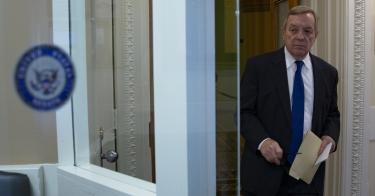Defeat by a Thousand Innuendos — that’s the strategy being pursued by those who oppose Judge Brett Kavanaugh’s Supreme Court nomination. There is so little of substance to use against him, they are left with tossing around little more than speculation, supposition, or suggestion.
Senator Dick Durbin (D., Ill.) for example, is pushing the notion that Kavanaugh might have misled the Senate in 2006, when he was appointed to the U.S. Court of Appeals, about his knowledge of Bush-administration anti-terror policies.
An innuendo can travel a thousand miles before the context or the rest of the story gets out of bed. Those peddling this fiction know that all they have to do is let it float on the political Jetstream. Pulling it back to solid ground requires looking at the cast of characters, the memos, and the hearing questions.
First, the cast of characters:
Brett Kavanaugh — Associate Counsel to President George W. Bush from 2001 until June 2003, then Assistant to the President and White House Staff Secretary until he was appointed to the U.S. Court of Appeals for the D.C. Circuit in May 2006.
Jay Bybee — Assistant Attorney General, heading the Justice Department’s Office of Legal Counsel, from November 2001 until March 2003, when President Bush appointed him to the Ninth Circuit.
William Haynes — General Counsel of the Department of Defense from May 2001 to March 2008. President Bush nominated him to the Fourth Circuit, but the full Senate never voted on his nomination.
Second, the memos:
Bybee approved a series of Justice Department memos regarding enhanced interrogation techniques and prisoner detention. These included a memo to Haynes dated March 13, 2002, and one to White House Counsel Alberto Gonzalez dated August 1, 2002. These memos were leaked to the media in June 2004, after Bybee’s judicial appointment, and were later rescinded by the Justice Department.
Third, the hearing questions:
In Kavanaugh’s May 2006 confirmation hearing, senators asked two kinds of questions, one direct, and one indirect, about the Bush administration’s anti-terrorism policies. First, they asked Kavanaugh directly about his own role in developing those policies. Kavanaugh told them he had nothing to do with the issues of interrogation or the “rules governing detention of combatants.” Those issues, he said, were “not part of my docket, either in the Counsel’s Office or as Staff Secretary.” And he told Senator Patrick Leahy (D., Vt.) that he was not aware of the controversy over the memos until they became public in 2004.
The indirect questions concerned something that was part of his docket: judicial nominations. Durbin and Senator Ted Kennedy (D., Mass.) asked Kavanaugh whether he knew, when Bybee and Haynes were nominated for judgeships, about their role in the administration’s anti-terror policies. Kavanaugh said that neither nomination was one he had worked on and repeated that he was not aware of Bybee’s memos until they were publicly disclosed in the summer of 2004. Finally, Senator Chuck Schumer (D., N.Y.) asked Kavanaugh whether he was “involved in any way in the Counsel’s Office in opining about the proper use of torture.” Kavanaugh replied: “No, senator.”
Durbin’s suggestion that Kavanaugh misled, or even lied to, to the Judiciary Committee in 2006 implies that there’s some new reason to think so, some new evidence for this charge. There isn’t. Durbin is simply resurrecting the same complaint that he made in 2007. The so-called evidence consists of one article in the Washington Post and another from National Public Radio, both in 2007, about a single 2002 conversation.
This slim reed won’t bear much weight, so let’s examine it carefully. Those two articles describe a meeting in which some Bush-administration lawyers discussed whether Americans captured as enemy combatants are entitled to counsel. Kavanaugh, who had clerked for Supreme Court Justice Anthony Kennedy, opined that his former boss would likely say yes.
That’s it. Neither the Post nor NPR suggested that Kavanaugh said anything about the merits of that issue or offered any personal views about detention, interrogation, or other anti-terrorism issues or policies.
NPR’s report noted New York University legal-ethics professor Stephen Gillers’s opinion that this single discussion was not enough for Kavanaugh, as a judge, to recuse himself from detainee cases. Nor is it inconsistent, in any way whatsoever, with Kavanaugh’s 2006 hearing testimony. Suggesting otherwise is no more valid today than when Durbin tossed this innuendo around in 2007.
This piece originally appeared in the National Review



